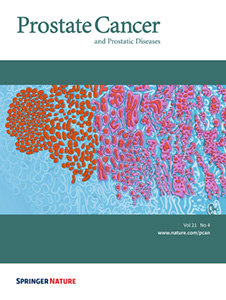
- UroToday Home

- Journal
Journal: Prostate Cancer and Prostatic Diseases
Role of Physical Activity and Its Link with Lower Rates of Progression in Men on Active Surveillance - Editorial
“Eat right and exercise”. As a prostate cancer provider, I can’t count how many times I have given this advice to my patients. I am always afraid when they ask back, “Will it actually help”? The truth is, we don’t know. While increasing data suggest that diet and exercise may modulate prostate cancer risk and even progression in some studies, the totality of the evidence remains weak. Into this void, steps an important paper exploring the role of physical activity (i.e. exercise) and its link with lower rates of progression in men on active surveillance.
In this study, the authors assessed 85 men with low-risk prostate cancer being managed by active surveillance. All men completed a physical activity questionnaire at baseline and were categorized as sedentary (n=24), moderately active (n=46), or active (n=15). The authors then assessed the risk of grade reclassification, commonly used criteria for “progression” among men on active surveillance. The authors found that those who progressed were less physically active (p=0.056). Importantly, over time, the level of physical activity was significantly predictive of who progressed (p=0.033). Indeed, on multivariable analysis, the level of physical activity was the only significant predictor of progression (p=0.016). The authors concluded that physical activity may influence prostate cancer evolution.

Stephen J. Freedland, MD
Stephen J. Freedland, MD, is director of the Center for Integrated Research in Cancer and Lifestyle and co-director of the Cancer Genetics and Prevention Program and Associate Director for Faculty Development at the Cedars-Sinai Samuel Oschin Comprehensive Cancer Institute. He is also a faculty physician in the Division of Urology within the Department of Surgery at Cedars-Sinai. He has served on numerous American Urological Association guideline panels for prostate cancer and co-chaired a prostate cancer guideline panel for the American Society of Clinical Oncology.
Dr. Freedland's clinical area of expertise focuses on urological diseases, particularly benign prostatic hyperplasia and prostate cancer. His approach toward cancer prevention and awareness focuses on treating the whole patient, not just the disease, by combining traditional Western medicine with complementary holistic interventions. His research interests include investigations on urological diseases and the role of diet, lifestyle and obesity in prostate cancer development and progression, as well as prostate cancer among racial groups and risk stratification for men with prostate cancer.


PCAN: November 2020
Abiraterone and Enzalutamide Had Different Adverse Effects on the Cardiovascular System: A Systematic Review with Pairwise and Network Meta-Analyses - Full Text Article
Background Abiraterone and enzalutamide may increase the risk of cardiovascular events in patients with castration-resistant prostate cancer (CRPC).Methods A comprehensive literature search was performed using a combination of keywords related to “abiraterone,” “enzalutamide,” “prostate cancer,” and “adverse events.” Phase II–IV randomized controlled trials (RCTs) on abiraterone

PCAN: October 2020
Immunohistochemistry-Based Assessment of Androgen Receptor Status and the AR-Null Phenotype in Metastatic Castrate Resistant Prostate Cancer - Full Text Article
Background Molecular and immunohistochemistry-based profiling of prostatic adenocarcinoma has revealed frequent Androgen Receptor (AR) gene and protein alterations in metastatic disease. This includes an AR-null non-neuroendocrine phenotype of metastatic castrate-resistant prostate cancer which may be less sensitive to androgen receptor signaling inhibitors. This AR-null non-neuroendocrine phenotype is thought to be associated with TP53 and RB1 alterations. Herein, we have correlated molecular profiling of metastatic castrate-resistant prostate cancer with AR/P53/RB immunohistochemistry and relevant clinical correlates.
PCAN: September 2020
Diagnostic Performance of 18F-PSMA-1007 PET/CT in Biochemically Relapsed Patients with Prostate Cancer with PSA Levels ≤ 2.0 Ng/ml - Full Text Article
Background: The aim of the study was to prospectively evaluate the diagnostic performance of 18F-PSMA-1007 PET/CT in patients with prostate cancer (PCa) after radical treatment and low but rising prostate-specific antigen (PSA) levels.Methods: We prospectively enrolled 40 consecutive patients after radical treatment (80%—radical prostatectomy, 20%— radiation beam therapy) of PCa and low (0.008 to ≤2.0 ng/ml), rising PSA. Skull to mid-thigh PET/CT imaging was performed 95 (±12) min after injection of 295.5 (±14.1) MBq 18F-PSMA-1007. Detection rate was correlated with PSA levels,

PCAN: August 2020
Testosterone Therapy does not Increase the Risks of Prostate Cancer Recurrence or Death after Definitive Treatment for Localized Disease - Full Text Article
Background: The safety of testosterone therapy (TT) after definitive treatment for localized prostate cancer remains undefined. We analyzed the risks of biochemical recurrence and mortality in men receiving TT after treatment for localized prostate cancer.Methods: Cohort analysis using the national US Veterans Affairs Informatics and Computing Infrastructure. We identified 69,984 patients with localized prostate cancer diagnosed from 2001 to 2015 treated with surgery or radiation. We coded receipt of TT after treatment as a time-dependent covariate; used the National Death Index to identify cause of death; and defined biochemical recurrence as PSA > 0.2 ng/mL after surgery and nadir + 2 ng/mL after radiation. We analyzed recurrence and mortality using cumulative incidence curves, Fine–Gray competing risk regression, and Cox regression.

PCAN: July 2020
The Association Between Inflammatory Bowel Disease and Prostate Cancer Risk: a Meta-Analysis - Full Text Article
Background: Patients with inflammatory bowel disease (IBD) are at increased risk of gastrointestinal and extraintestinal malignancies. However, the associations between IBD and prostate cancer (PCa) risk remain conflicting.Methods: We conducted a systematic literature search in PubMed, EMBASE, and Web of Science databases. According to the inclusion and exclusion criteria, a total of nine studies were included in the meta-analysis. The pooled standardized incidence ratios (SIRs) or relative risks (RRs) and corresponding 95% confidence intervals (CIs) were calculated to determine the relationship of IBD and PCa risk.

